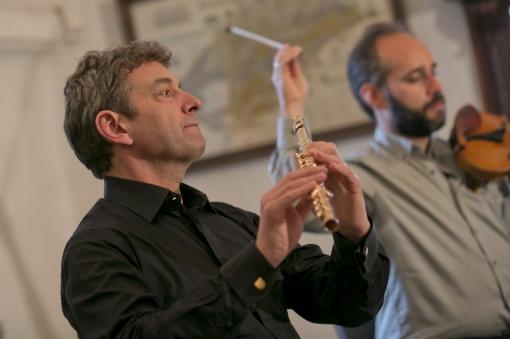This year's 27th edition of the Concentus Moraviae Music Festival is slowly coming to a grand finale as a joint concert by flutist and artist in residence Kaspar Zehnder, mezzo-soprano and patron of the festival Magdalena Kožená, and her husband, pianist and conductor Sir Simon Rattle. On Friday 24 June, at one of the last concerts of the culminating festival, artist-in-residence Kaspar Zehnder, together with his friends Giovanni Guzzo (violin), Rahel Maria Rilling (violin), Amihai Grosz (viola), Dávid Adorján (cello), Wolfgang Klinser (clarinet), and Anaïs Gaudemard (harp), prepared the dramaturgy of Friday's chamber concert in the library of the Náměšť Castle.
While many of the previous festival concerts have looked to the past, folk inspirations, and old musical forms as part of this year’s theme, entitled Journey from Roots to the Future, the Friday concert in Náměšt’ nad Oslavou, according to Kaspar Zehnder, looked more to the future. As the artist himself explained, “All three works are the result of the highest compositional mastery; in a way, they represent the best of an entire era in terms of instrumentation, work with form and the role that these pieces played in their time.” The trio of works that inspired future composers were Wolfgang Amadeus Mozart’s Clarinet Quintet in A major, Claude Debussy’s Sonata for Flute, Viola, and Harp, and Maurice Ravel’s Introduction et Allegro for Harp, Flute, Clarinet and String Quartet.

The evening opened with Mozart’s Clarinet Quintet in A major, which in its own way stands among the works that opened the way for the coming Romanticism. In its melodic richness, work with motifs, variability of tempo and variety of moods, it ranks among Mozart’s top works. But what defines the work across all four movements (Allegro, Larghetto, Menuetto, Allegretto con Variazioni) is its pervasive sweetness and musical elegance. The musicians were well aware of this musical positioning of the Clarinet Quintet, and their interpretation was defined by a dreamy elegance from which typical Mozartian exaggeration poked out here and there. Especially the clarinet in Wolfgang Klinser’s interpretation impressed with its expressive variety, which on selected parts appropriately moved from lyrical tenderness to more jocular and light-hearted positions. The rhythmic and dynamic interplay between the musicians was also excellent, even in the slightest rubati. It was in the Larghetto movement, where the clarinet melody alternates with the violin’s scaled runs in pianissimo, that the expressive and dynamic interplay between the musicians was at its best.
Debussy’s Sonata for flute, viola, and harp is already striking at first sight because of its scoring. What is not immediately obvious, however, is the excellent use of a number of compositional elements that this chamber-like and unusual instrumentation allowed him to make. Nothing is lacking here, and the composer’s exemplary work with texture creates often excellent tonal combinations. In the performances by flutist Kaspar Zehnder, violist Amihai Grosh, and harpist Anaïs Gaudemard, not only the tender musical position but also a certain mysticism of the work came across well. Their work with expression in the minuet-inspired second movement of the Interlude deserves particular praise. Tempo di minuetto, which contains not only hypnotic decompositions of the harp and meditative dialogues between the three instruments, but also much more raucous and rhythmically structured positions. It is on these hilarious contrasts – supported, moreover, by the striking dynamic shading – that the success of their interpretation has largely rested.

The final work of the evening was Maurice Ravel’s Introduction et Allegro for harp, flute, clarinet, and string quartet, which is often described as a miniature concerto for harp. It was in this work that all the musicians were able to join forces and it was astonishing how powerful and – with a bit of exaggeration – almost orchestral sound the chamber ensemble managed to create. Ravel, however, had long experimented with the forms of the “chamber symphony” or “chamber concerto”, and his Introduction et Allegro is one of the most successful of these works. It is that unusual contrast between the orchestral compositional approach and the still relatively modest scoring that adds to the work’s charm. The composition retains the clarity and intimacy of chamber music but dazzles with surprising power in the many dramatic tutti sections. The dramaturgy quite rightly left this work until the end of the evening. There was nothing to fault in the performance itself. The musicians were excellently matched rhythmically and dynamically, and where they ascended to more forceful positions they in turn asserted their own color and expression. The rubato harp cadenza was exemplarily punctuated and the phrasing of the melody with subtle accents also deserves praise.
Friday’s concert at the castle in Náměšt’ nad Oslavou became a tasty overture before the aforementioned festival finale. At the same time, it was the penultimate opportunity to attend a concert with artist-in-residence flutist and conductor Kaspar Zehnder. However, the positive impression of the whole evening was spoiled by the ignorance of concert ethics of many visitors. One simply does not applaud between the movements. Especially if the sentence that just sounded was gentle, quiet, and fragile. Applause at such a moment not only breaks any attachment to the music to come, but it also upsets the performers, whose concentration and mental state are thrown off. And that grumpiness applies to all involved.
Anaïs Gaudemard / harp
Kaspar Zehnder / flute
Wolfgang Klinser / clarinet
Rahel Maria Rilling, Giovanni Guzzo / violin
Amihai Grosz / viola
Dávid Adorján / cello
Wolfgang Amadeus Mozart: Clarinet Quintet in A major KV 581
Claude Debussy: Sonata for flute, viola, and harp
Maurice Ravel: Introduction et Allegro for harp, flute, clarinet, and string quartet
Fri 24/6/2022, 19:30
Náměsť nad Oslavou
Castle, library

































No comment added yet..